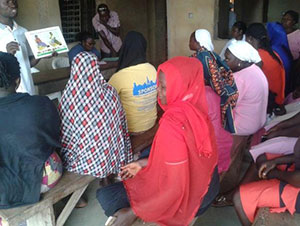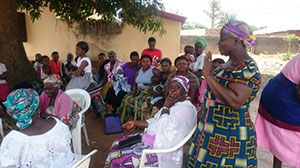The Important Role of Caregiver Support Groups for Community Infant and Young Child Feeding

Caregivers of orphans and vulnerable children (OVC) in the Jaba local government area (LGA) of Kaduna state want to ensure that the youth they supervise receive the best possible nutrition. But the primary healthcare centers (PHCs) serving this community have not had a way to teach caregivers the nutrition practices critical for the health of this special group of children.
To solve this problem, SPRING/Nigeria collaborated with Nigeria’s Ministry of Health (MOH), Ministry of Women’s Affairs (MOWA), and the USAID-funded STEER project to roll out the community infant and young child feeding (C-IYCF) training package. This set of training guides, counseling materials, and take-home brochures helps families and caregivers adopt and sustain high-impact nutrition practices.
All the primary healthcare centers linked to community infant and young child feeding support groups in Jaba LGA have witnessed a tremendous increase in coverage for health services.
- LGA social mobilization officer, Sunday Shimen
Partners began the roll out with trainings at the centers to introduce the package. In Jaba, the three-day nutrition training greatly increased the knowledge of center workers and community volunteers.
Subsequently, community volunteers established 29 infant and young child feeding support groups and linked them to eight local health centers. In Sab-Chem, for instance, 143 community members joined support groups that meet monthly at the centers to discuss and encourage appropriate nutrition practices. The center officer-in-charge provides guidance during the discussions.

The improved ability of centers to provide accurate nutrition information has generated greater demand for nutrition services and increased caregiver turnout. The Sab-Chem center alone has witnessed more than an 80 percent upturn in client flow. Joseph Mamman, an LGA nutrition focal person, acknowledged this remarkable change: “We will tell our story: that Jaba LGA is no longer lagging behind in nutrition and health status in Kaduna state.”
Since joining the support groups, caregivers’ attitudes about and understanding of nutrition have improved. Many of the members have adopted best practices such as early initiation of breastfeeding, exclusive breastfeeding for six months, appropriate and timely complementary feeding, handwashing, and breastfeeding practices for HIV-positive mothers. Caregivers are also sharing these key messages with other members of their communities.
Through this and other programming efforts, we continue to collaborate with the MOH, MOWA, and other USAID implementing partners on the shared vision of bringing better nutrition and health to orphans and vulnerable children across Nigeria.